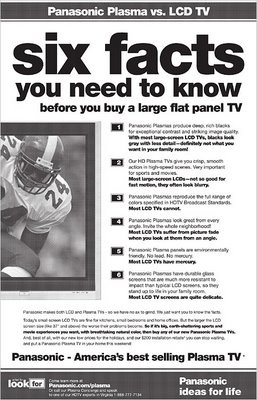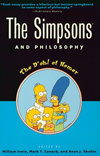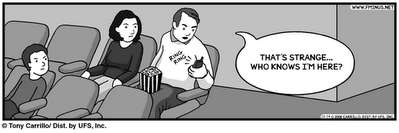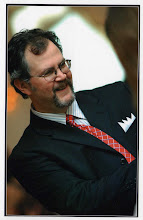Tuesday, December 26, 2006
But I was just getting used to the old new TV

My family is clamoring for a new HDTV.
Mind you, there are three of us and we already have three TVs: a 32" in the living room, a 16" in my bedroom, and another 17" with a built-in DVD player in my daughter's room. All hooked up to cable. We used to have a fourth, in my basement office, an old 19" Sharp, but got rid of it when we decided that four cable boxes were too much.
So what to do? Since all TVs will be HD compatible by you wonder if they'll be able to give away analogues -- if they'll even manufacture them -- between now and then.
So, taking it as fate that the next set we buy will be an HD, the question becomes Plasma or LCD?
A full-page ad in The New York Times decries the benefits of plasma and generated a story on Dec. 25. It gets almost nasty, almost ike a political campaign, smearing the reputation of LCDs.
Oh, yeh, plasma sets are more expensive.
So, who do you trust? Salespersons? Consumer Reports? Your own eyes? Word has it that they crank up the resolution in the stores to give it the best picture possible.
There are plenty of Web sites offering advice: Sound and Vision Magazine gives reports on various products. And places like Cnet.com always have advice to give.
We're still struggling to decide.
Things used to be much simpler.
Monday, December 18, 2006
Something to think about

As I get older, I regret all the things I never learned in school. I always wanted to take philosophy classes, but all you can do with that is think and teach. Steve Martin once said that you can take a course and you forget about in shoon thereafter, but taking one philosophy course is enough to screw you up for the rest of your life.
So thanks to the folks at Open Court Books, for their "Popular Culture and Philsophy" series that puts this deep subject into chunks a philistine like myself can deal with.
Among the company's booklist:
- James Bond and Philosophy: Questions are
- The Beatles and Philosophy: Nothing You Can Think That Can't be Thunk
- Monty Python and Philosophy: Nudge Nudge, Think Think
- The Undead and Philosophy: Chicken Soup for the Souless
- The Simpsons and Philosophy: The D'Oh of Homer
- The Sopranos and Philosophy: I Kill, Therfore I Am
- Superheroes and Philosophy: Truth, Justice, and the Sorcactic Way
 The list goes on, including my personal favorite, Baseball and Philosophy: Thinking Outside the Batter's Box.
The list goes on, including my personal favorite, Baseball and Philosophy: Thinking Outside the Batter's Box.One will take not that most of the titles deal either with movies or television shows, submitting that those are the stores where we buy our culture. Granted, none of these should be taken too seriously, and no doubt the "serious" philosophers and educators are just shaking their heads sadly at the prospect, but, darn it, they are fun. So what's wrong with that?
Thursday, December 14, 2006
"Put on a yarmulka, it's time for ... Chrismukkah"
 According to Wikipedia, Chrismukkah is the modern-day merging of Christmas and Hanukka as celebrated in interfaith or in a household of two Jewish parents where one may not be religious at all and has a desire to put up a Christmas tree while the other is very religious causing the two events “to cancel each other out into one blur of a gift giving holiday.”
According to Wikipedia, Chrismukkah is the modern-day merging of Christmas and Hanukka as celebrated in interfaith or in a household of two Jewish parents where one may not be religious at all and has a desire to put up a Christmas tree while the other is very religious causing the two events “to cancel each other out into one blur of a gift giving holiday.”
An exhibit at the Jewish Museum of Berlin called “Chrismukkah: Stories of Christmas and Hanukkah,” sourced the origin of the word to German-Jews in the late 1800s who called the holiday "Weihnukkah." (Weihnachten is the German word for Christmas.)
The Fox Televison program The O.C., which features the Cohens, an interfaith family, is credited with introducing the concept in a 2003 holiday episode titled “The Best Chrismukkah.”
 Since then, each holiday season features a show will a similar theme, including, “The Chrismukkah Show” (2004); “The Chrismukkah Bar Mitz-vahkkah” (2005); and the most recent, “The Chrismukk-huh?,” which aired Dec. 14.
Since then, each holiday season features a show will a similar theme, including, “The Chrismukkah Show” (2004); “The Chrismukkah Bar Mitz-vahkkah” (2005); and the most recent, “The Chrismukk-huh?,” which aired Dec. 14.
In December, 2004 Chrismukkah was listed in Time Magazine as one of the “buzzwords of the year.”
Which seems sort of ironic since observant Jews have always considered Hanukka as a celebration of fighting against assimilation.
Wednesday, December 13, 2006
Book Review -- Walt Disney: Triumph of the American Imagination

Neal Gabler's exhaustive biography of one of America's iconic figures follows his subject from a humble Missouri childhood to his (relatively) sudden death at age 65. Gabler is the first writer to be given complete access to the Disney archives, and it shows in this meticulously researched book. Reviewed by Ron Kaplan on Bookreporter.com.
Tuesday, December 12, 2006
Cellphone etiquette: An oxymoron?

"Are Blackberry users the new smokers?" asks an editorial in USA Today, decriying the lack of courtesy when it comes to cell phone use.
While there doesn't seem to be a similar "second-hand" danger, many find being in proximity to someone lost in conversation to the exlcusion of being aware of their surroundings just as obnoxious, if not as noxious.
I used to travel to Manhattan via comuter bus. Despite signs warning people that "cell phone use is prohibited," riders regularly dialed in, calling home to alert a wife that he would be home in 10 minutes (so get your boyfriend out of the house) or a husband that she was not happy with the way the nanny dressed her little precious. And God forbid you should politely ask someone to tone it down or remind them of such prohibitions. Sarcastic responses at best, threats of physical harm at worst.
A radio commercial in my area features a very self-absorbed woman engaged in such a conversation, laughing riotously and dismissing the concern of her co-conversationalist about her ebullience. "What do I care, I'll never see these people again," she sniffs.

And I can't count the number of drivers I pass on a daily basis who are trying to balance cellphones (even though state law decrees using hands-free devices only while driving), coffee, food, and/or reading materials.
The essay cites a study by that found that a third of BlackBerry users show signs of addiction "similar to alcoholics." And I'm sure studies have been or will be done about the frequency of accidents when using such appliances.
I guess that means people who plan on using their cellphones should make sure they have a designated caller. Can't you see the promos now? "Friends don't let friends call and drive."
